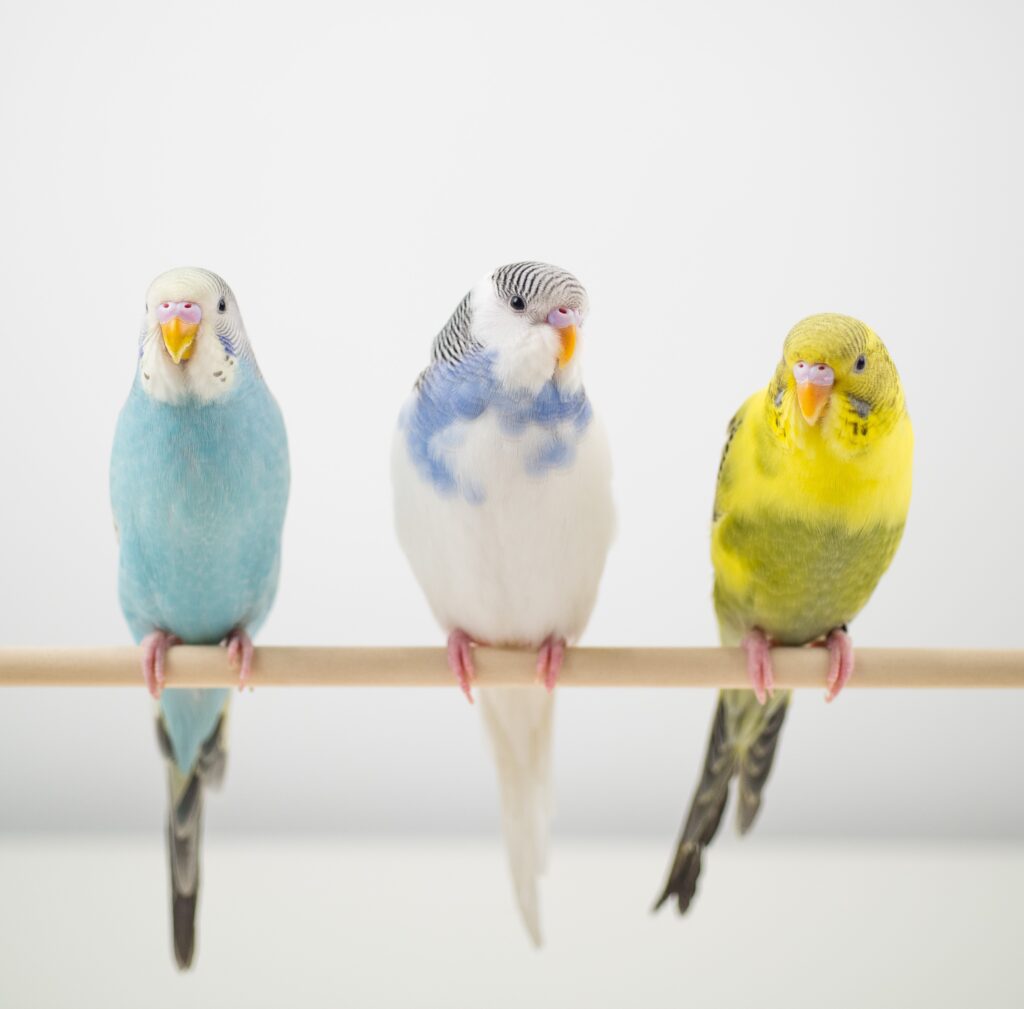How to Take Care of a Budgie: Daily Budgie Care Guide
- Admin

Categories
Don’t miss our future updates!
Get Subscribe today!
Budgies, also known as parakeets or budgerigars, are delightful pets that can bring a bright and cheerful atmosphere to any home. These small, vibrant birds are known for their playful personalities, social nature, and ability to mimic human speech. If you’re a beginner looking to bring a budgie into your life, you’re in the right place! This comprehensive budgie care guide will walk you through everything you need to know, from diet and grooming to cage setup and daily routines. Let’s dive into how you can give your budgie the best care possible.
Why Budgies Make Great Pets
Budgies are not only adorable but also easy to care for, making them a popular choice for first-time bird owners. They’re intelligent, social, and can form strong bonds with their owners. With proper care, a budgie can live anywhere from 5 to 10 years, and sometimes even longer.
Whether you’re keeping a single budgie or a pair, these birds thrive in environments where they feel safe, entertained, and properly nourished. Budgies are best kept in a quiet space with plenty of toys, perches, and social interaction. The bond you develop with your budgie can be deeply rewarding!
Setting Up Your Budgie’s Home
1) Choosing the Right Cage
The first step in caring for your budgie is to ensure they have a comfortable and safe living space. The cage should be spacious enough for your budgie to move freely and spread its wings. Aim for a cage that’s at least 18 inches wide, 18 inches deep, and 24 inches tall. Larger cages give your budgie more space to explore and play.
When choosing a cage, consider the following:
- Bar Spacing: Ensure that the bars are no wider than ½ inch apart to prevent your budgie from escaping or getting stuck.
- Material: Stainless steel cages are the best option since they’re durable and easy to clean. Avoid cages with painted bars, as they could be toxic.
- Cage Placement: Place the cage in a quiet space with plenty of natural light. Keep it away from drafts, loud noises, or areas with excessive heat.
2) Perches and Toys for Entertainment
Budgies are playful and need a variety of toys and perches to stay engaged and happy. Some great options include:
- Natural Wood Perches: These help wear down your budgie’s claws and provide a natural surface for them to grip.
- Chew Toys: Budgies love to chew on things, so provide some bird-safe toys made from untreated wood, paper, or natural fibers.
- Swinging Toys: Budgies enjoy perching on swings or ladders to explore different areas of their cage.
Rotate the toys regularly to prevent boredom and encourage mental stimulation.
Budgie Diet: What to Feed Your Budgie
A healthy diet is essential for your budgie’s overall well-being. Budgies are herbivores, so their diet should primarily consist of seeds, pellets, fresh vegetables, and fruits.
Seeds and Pellets
- Seeds: High-quality seeds are a staple in your budgie’s diet. However, don’t rely on them exclusively as they may lack essential nutrients.
- Pellets: Pellets are a well-balanced alternative to seeds. They are formulated to provide your budgie with a wide range of vitamins and minerals. It’s best to offer both seeds and pellets to give your budgie variety.
Fresh Fruits and Vegetables
Budgies love fresh vegetables and fruits, and they’re a great source of essential nutrients. Some safe options include:
- Carrots
- Spinach
- Cucumber
- Apple slices (without seeds)
- Berries
Avoid feeding them avocados, as these can be toxic to birds. Ensure that the food you provide is washed thoroughly and cut into manageable pieces.
Water and Calcium
Clean water should always be available to your budgie. Change the water daily to ensure it’s fresh and free from contaminants.
Additionally, provide a source of calcium such as cuttlebone or mineral blocks. These help keep your budgie’s bones healthy and support feather growth.
Daily Budgie Care Routine
Caring for a budgie involves more than just feeding and providing water. Establishing a daily routine will help ensure your budgie remains healthy and happy.
Morning Routine: Cage Cleaning and Fresh Food
- Clean the Cage: Start your day by cleaning your budgie’s cage. Remove any old food, soiled bedding, or waste. Wipe down the bars with a bird-safe cleaner.
- Provide Fresh Food and Water: Replace the food and water to ensure your budgie has fresh options. A mix of seeds and pellets, along with some fresh vegetables, will keep them nourished.
- Bath Your Budgie: Budgies love to bathe, so offer them a shallow dish of water or a gentle spray of water to keep their feathers clean and healthy. This also helps maintain their natural oils.
Midday Care: Playtime and Social Interaction
Budgies are social creatures and enjoy interacting with their owners. If you can, spend some time playing with your budgie every day. You can:
- Let them out of the cage: Ensure the room is safe by removing potential hazards. Let your budgie fly around and stretch its wings.
- Engage with toys: Use interactive toys to encourage play, such as mirrors or foraging toys that challenge them mentally.
- Training: Budgies can be trained to step up, talk, or even perform simple tricks. Spend a few minutes each day training them to improve their bond.
Evening Routine: Quiet Time and Rest
As your budgie settles down for the night, reduce noise levels and dim the lights to help them wind down. Make sure their cage is placed in a quiet space away from noise and distractions.
Budgie Grooming and Hygiene
Just like any other pet, your budgie requires grooming to stay healthy.
- Feather Care: Budgies naturally preen themselves, but you can help by offering a grooming bath. Regularly inspect their feathers to ensure they’re clean and free from any parasites.
- Beak and Nail Care: Overgrown beaks and nails can be a problem for budgies. If your budgie’s beak or nails grow too long, consult your vet for advice on trimming them.
Common Health Issues in Budgies
While budgies are generally healthy, they can develop a few common health problems. Keep an eye out for the following:
- Respiratory infections: Signs include coughing, sneezing, and difficulty breathing. Consult a vet if you notice these symptoms.
- Feather Plucking: Excessive feather plucking can be a sign of boredom, stress, or health issues. Ensure your budgie’s cage environment is enriching and provide enough entertainment.
- Diarrhea or loss of appetite: These can be signs of digestive problems. Consult your vet if these symptoms persist.
When to See a Vet
Regular veterinary care is essential for your budgie’s health. Schedule annual checkups with an avian vet to monitor your bird’s health and address any potential issues. If your budgie displays abnormal behavior, such as excessive lethargy, changes in eating habits, or difficulty flying, it’s important to seek veterinary care immediately.
Budgie Companionship: Should You Get a Pair?
Budgies are naturally social and may thrive when kept in pairs. If you’re considering getting a second budgie, make sure your cage is large enough to accommodate both birds. A pair can help keep each other entertained and provide mutual companionship.
However, if you choose to keep a single budgie, make sure to dedicate time each day to interact with it, as they can become lonely without enough attention.
Conclusion: A Happy and Healthy Budgie
Taking care of a budgie may seem overwhelming at first, but with the right knowledge and commitment, you can ensure that your bird leads a happy, healthy life. By setting up an enriching environment, offering a balanced diet, and providing plenty of attention and social interaction, you can build a lasting bond with your new feathered friend.
Key Takeaways:
- Proper cage size and a clean environment are crucial for a healthy budgie.
- A balanced diet of seeds, pellets, and fresh fruits and vegetables will keep your budgie healthy.
- Regular playtime and social interaction are essential for a happy budgie.
- Keep their cage clean, and offer them a chance to bathe and preen.
If you’re just getting started with your budgie, don’t worry—it’s a learning process, and with this guide, you’re well on your way to providing the best care for your new pet!
About us

We believe that owning a pet bird should be joyful, educational, and fulfilling. That’s why we’re building a library of helpful guides, health tips, training techniques, and care routines — all tailored specifically for budgies.
News Letter
Don’t miss our future updates!
Get Subscribe today!
© 2025 – Budgie Planet – All rights reserved.